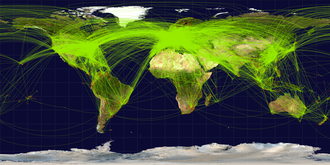Commercial aviation

Commercial aviation is the part of civil aviation (both general aviation and scheduled airline services) that involves operating aircraft for hire to transport passengers or multiple loads of cargo. Originating in the early 20th century, commercial aviation has grown significantly and has become a major component of the global transportation system.
History[edit]
The history of commercial aviation dates back to 1914, when the first scheduled air service began with a flight between St. Petersburg and Tampa, Florida, operated by the St. Petersburg-Tampa Airboat Line. Since then, the industry has seen rapid growth, driven by technological advancements in aircraft design, navigation, and safety systems, as well as economic and regulatory developments.
Types of Commercial Aviation[edit]
Commercial aviation can be broadly categorized into two main types: scheduled air transport and charter air transport. Scheduled air transport services operate according to a fixed timetable, while charter services are arranged on an ad hoc basis, often for specific groups or purposes.
Scheduled Airline Services[edit]
Scheduled airline services are the backbone of commercial aviation, connecting cities and countries around the world. Airlines operate flights on regular routes according to a published schedule, offering tickets to the general public. This category includes both full-service carriers, which offer a range of amenities and services, and low-cost carriers, which focus on minimizing operational costs and offering lower fares.
Charter Air Transport[edit]
Charter air transport services offer flights that are not part of the regular scheduled services. These can range from private jet hire for individuals or small groups to large aircraft chartered by tour operators or corporations. Charter flights offer flexibility and convenience for passengers, often catering to specific needs or preferences.
Regulation[edit]
The commercial aviation industry is heavily regulated to ensure safety, security, and fairness in the marketplace. Key international organizations involved in the regulation of commercial aviation include the International Civil Aviation Organization (ICAO), which sets global standards and regulations, and regional bodies such as the European Aviation Safety Agency (EASA) and the Federal Aviation Administration (FAA) in the United States. Regulations cover a wide range of aspects, from aircraft airworthiness and pilot licensing to air traffic management and environmental impacts.
Economic Impact[edit]
Commercial aviation has a significant economic impact, both in terms of its contribution to the global economy and its role in facilitating international trade and tourism. The industry supports millions of jobs worldwide, including direct employment within the aviation sector and indirect employment in related industries such as tourism and hospitality. Moreover, the efficiency and speed of air travel have made it an essential component of global business operations.
Challenges and Future Trends[edit]
The commercial aviation industry faces several challenges, including environmental concerns, the need for sustainable development, fluctuating fuel prices, and geopolitical issues. In response, the industry is focusing on innovations such as more fuel-efficient aircraft, alternative fuels, and improvements in air traffic management to enhance efficiency and reduce environmental impact.
The future of commercial aviation is likely to see continued growth in demand, driven by increasing global connectivity and economic development. Innovations in technology, including unmanned aerial vehicles (UAVs) and supersonic travel, may also shape the future of the industry.
Ad. Transform your life with W8MD's Budget GLP-1 injections from $75


W8MD offers a medical weight loss program to lose weight in Philadelphia. Our physician-supervised medical weight loss provides:
- Weight loss injections in NYC (generic and brand names):
- Zepbound / Mounjaro, Wegovy / Ozempic, Saxenda
- Most insurances accepted or discounted self-pay rates. We will obtain insurance prior authorizations if needed.
- Generic GLP1 weight loss injections from $75 for the starting dose.
- Also offer prescription weight loss medications including Phentermine, Qsymia, Diethylpropion, Contrave etc.
NYC weight loss doctor appointmentsNYC weight loss doctor appointments
Start your NYC weight loss journey today at our NYC medical weight loss and Philadelphia medical weight loss clinics.
- Call 718-946-5500 to lose weight in NYC or for medical weight loss in Philadelphia 215-676-2334.
- Tags:NYC medical weight loss, Philadelphia lose weight Zepbound NYC, Budget GLP1 weight loss injections, Wegovy Philadelphia, Wegovy NYC, Philadelphia medical weight loss, Brookly weight loss and Wegovy NYC
|
WikiMD's Wellness Encyclopedia |
| Let Food Be Thy Medicine Medicine Thy Food - Hippocrates |
Medical Disclaimer: WikiMD is not a substitute for professional medical advice. The information on WikiMD is provided as an information resource only, may be incorrect, outdated or misleading, and is not to be used or relied on for any diagnostic or treatment purposes. Please consult your health care provider before making any healthcare decisions or for guidance about a specific medical condition. WikiMD expressly disclaims responsibility, and shall have no liability, for any damages, loss, injury, or liability whatsoever suffered as a result of your reliance on the information contained in this site. By visiting this site you agree to the foregoing terms and conditions, which may from time to time be changed or supplemented by WikiMD. If you do not agree to the foregoing terms and conditions, you should not enter or use this site. See full disclaimer.
Credits:Most images are courtesy of Wikimedia commons, and templates, categories Wikipedia, licensed under CC BY SA or similar.
Translate this page: - East Asian
中文,
日本,
한국어,
South Asian
हिन्दी,
தமிழ்,
తెలుగు,
Urdu,
ಕನ್ನಡ,
Southeast Asian
Indonesian,
Vietnamese,
Thai,
မြန်မာဘာသာ,
বাংলা
European
español,
Deutsch,
français,
Greek,
português do Brasil,
polski,
română,
русский,
Nederlands,
norsk,
svenska,
suomi,
Italian
Middle Eastern & African
عربى,
Turkish,
Persian,
Hebrew,
Afrikaans,
isiZulu,
Kiswahili,
Other
Bulgarian,
Hungarian,
Czech,
Swedish,
മലയാളം,
मराठी,
ਪੰਜਾਬੀ,
ગુજરાતી,
Portuguese,
Ukrainian
